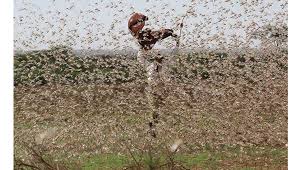Locust Control Offices (LCOs) have conducted control operations at 15 locations in Rajasthan and Madhya Pradesh (MP).

Locust Control Offices (LCOs) today conducted control operations at 15 locations in Rajasthan and Madhya Pradesh (MP).
In Rajasthan, operations were performed at 10 locations in districts of Jaipur, Dausa, Bikaner, Jodhpur, Barmer, Chittorgarh, Sri Ganganagar and Niwari and in Madhya Pradesh, the operations were performed in 5 locations one each in districts of Satna, Balaghat, Niwari, Raisen and Shivpuri.
As on 28th May, 2020 a total of 377 spots covering 53,997 hectares has been covered since Locust control operations started from 11th April, 2020. Districts covered by locust control are: Rajasthan - 22, Madhya Pradesh - 24; Gujarat - 2; Punjab - 1; Uttar Pradesh - 2; and Maharashtra - 3.
As per FAOs locust status Bulletin of 27th May, 2020, in Pakistan and Iran adults are forming groups and small swarms in spring breeding areas in Balochistan, Indus Valley (Pak) and southern coast and parts of Sistan-Baluchistan. These infestations will move to the summer breeding areas along the Indo-Pakistan from Cholistan to Tharparkar. In India, Spring-bred immature adult groups and swarms continued to move east and to the central states of Madhya Pradesh and Maharashtra. Much of these movements were associated with strong westerly winds from Cyclone Amphan.
Several successive waves of invasions can be expected until July in Rajasthan with eastward surges across northern India as far as Bihar and Orissa followed by westward movements and a return to Rajasthan on the changing winds associated with the monsoon. These movements will cease as swarms begin to breed and become less mobile. Swarms are less likely to reach south India, Nepal and Bangladesh.
Suman Chowdhury, Chief Analytical Officer, Acuité Ratings & Research on the recent locusts' attack and its impact on agriculture: "While the Covid lockdown disrupted the economy that had already slowed down in FY20, one silver lining has been a healthy growth in the agricultural sector on the back of a robust rabi crop output and the expectation of a good kharif season. The current locust attack in some of the western and northern states may not have any immediate impact on the primary crops since the rabi harvest has been largely completed and the sowing for kharif is yet to commence fully. However, there may be a moderate damage to the horticultural crops in some of the states. There can be an impact on the production of kharif crops such as cotton and pulses if the pest attack is not controlled effectively over the next few months with the onset of monsoon."
Register Now to Attend NextGen Chemicals & Petrochemicals Summit 2024, 11-12 July 2024, Mumbai

Subscribe To Our Newsletter & Stay Updated